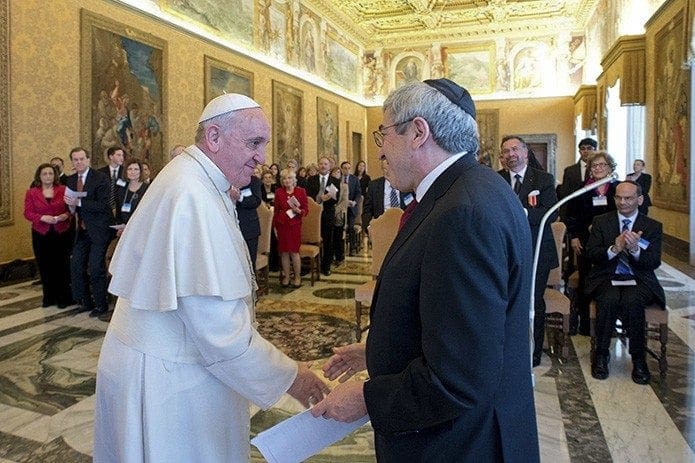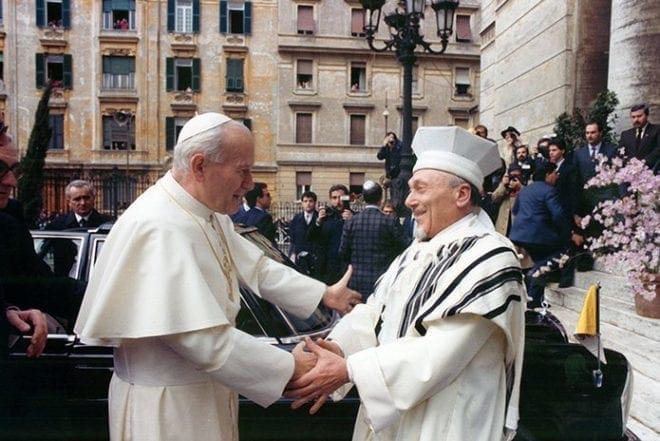 CNS photo/L'Osservatore Romano via Reuters
CNS photo/L'Osservatore Romano via Reuters Atlanta
Georgia Catholic, Jewish congregations to jointly mark jubilee of renewed dialogue
By PRISCILLA GREEAR, Special to the Bulletin | Published January 22, 2015
ATLANTA—This year the Archdiocese of Atlanta and American Jewish Committee (AJC) Atlanta Regional Office together will celebrate the 50th anniversary of the Second Vatican Council document “Nostra Aetate,” which transformed the church’s approach to Judaism after centuries of troubled relations and birthed a new era of partnership.
They are inviting neighboring Catholic and Jewish congregations to come together and plan events in spiritual unity through their Abrahamic roots to celebrate and explore this seminal document and establish ongoing partnerships. The jubilee will culminate in a celebration of art, music and religion on Oct. 28 at the Ferst Center at Georgia Tech.
Latin for “In Our Time,” “Nostra Aetate” passed in October 1965 during the pontificate of Pope Paul VI after intense debate at the council. It repudiates the centuries-old deicide charge against all Jews, stresses the religious bond shared by Jews and Catholics, and clarifies that there is no supersession of Judaism by Christianity and affirms the continuing validity of God’s covenant with the Jewish people. It affirmed respect for other world religions and called for respectful Jewish-Catholic dialogue for the first time in history.
Deacon Bob Hauert, parish administrator at Immaculate Heart of Mary Church, Atlanta, who serves on the planning committee, said congregations may hold any type of shared program from an artistic one to a dialogue or a prayer service. IHM plans to host a meal and a biblical drama based on the books of Romans and Job.
“This is an ongoing effort between the Archdiocese of Atlanta and the AJC’s Atlanta office to really celebrate the very important turning point in the relationship between the Catholic Church and the Jewish faith,” he said. “It’s been interesting to me to hear some of our Jewish friends talk about how significant this document is to them.”
The document “kind of opened that door,” he said. By repudiating the charge of deicide, “it removed the stigma of Catholics and (other) Christians” viewing all Jews as responsible for the death of Christ.
“Our hope is this will be kind of a beginning of a long-term relationship between local parishes and local synagogues … the foundation for ongoing dialogue and interaction between the different faiths,” he said.
Catholic churches partner with synagogues
The planning committee first met in late 2013. Events planned by Jewish and Catholic congregations working together may take place any time through October. The committee itself—along with other church, synagogue, community, and business members—will continue to meet regularly, plan and participate in various events together.
Partnering congregations include Holy Spirit Church and Temple Sinai; St. Jude Church and Congregation Or Hadash; All Saints Church and Temple Emanu-El; the Shrine of the Immaculate Conception, Our Lady of Lourdes, St. Anthony Church, and the Basilica of the Sacred Heart with The Temple; Immaculate Heart of Mary Church with Congregation Or VeShalom and Congregation Shearith Israel; Cathedral of Christ the King with Ahavath Achim Synagogue; Transfiguration Church with Temple Kol Emeth; St. Ann Church with Etz Chaim; St. Philip Benizi Church with Congregation B’nai Israel; Young Adult Ministry with Access Atlanta; and Newman Centers with Hillels of Georgia.

Pope John Paul II greets Rabbi Elio Toaff at Rome’s main synagogue April 13, 1986. The meeting marked the beginning of a new era in Catholic-Jewish relations. It was the first time a pope had entered the Rome synagogue.
Dov Wilker, regional AJC director, said that the anniversary is a time to build on the strong existing connections.
It’s “so communities can get to know each other and the importance of ‘Nostra Aetate’ … what took place, where we were, where we are, and where we’re going,” said Wilker. “We take for granted today the relationship between the Catholic and Jewish community. Over 50 years ago, there wasn’t a very strong relationship and anti-Semitism was present through the Catholic Church. … The document confirmed the bond between our two religions.”
Popes have taken historic steps
Anniversary events also reaffirm church solidarity against anti-Semitism.
Deacon Hauert, a board member of the Faith Alliance of Metro Atlanta, noted that “Nostra Aetate” is more relevant than ever in light of terror attacks in Paris and elsewhere.
“The world continues to shrink. There’s a lot of evil in the world, and it’s the people of faith that need to protect the world, to show the world, to witness to the world how to live,” he said.
Rabbi David Blumenthal, a Jewish studies professor at Emory University, hopes Pope Francis will continue support for the world’s small Jewish population of about 13.8 million. “The state of Israel is under vicious attack by extremist Islam and this will spread and intensify, dragging with it the Jews of Europe,” he wrote in an email from Europe. “The pope really is going to have to fight for tolerance and specifically against anti-Semitism and anti-Israelism. One can criticize the policy of any government, including Israel, but one always has to affirm the right of the people to security.”
Pope St. John Paul II, who witnessed the Holocaust as a young man in Nazi Germany-occupied Poland, took historic steps to reach out to the Jewish community in recognizing Israel as the legitimate Jewish homeland, welcoming Jewish visitors, praying at the Western Wall in Jerusalem and bringing the Holocaust to the center of consciousness. Pope Benedict in 2001 as then-Cardinal Ratzinger approved “The Jewish People and Their Sacred Scriptures in the Christian Bible” that affirms Jews as “elder brothers” and gives them a “unique place among all other religions.”
Now the faithful are encouraged to take this golden opportunity to learn more about this common spiritual heritage.
“All that we have in the Old Testament that comprises the largest part of the Bible, all of that comes through the Jewish lens,” said Deacon Hauert. “Many of our traditions or celebrations come from the foundation of the Jewish faith. The first Eucharist was the Passover meal celebrated by our Lord with his disciples.”
Msgr. Henry Gracz, pastor of the Shrine of the Immaculate Conception, also serves on the planning committee and is excited by upcoming events.
“There is a geographic closeness for a number of our Catholic churches and synagogues. We’re hoping they can twin together with some gatherings over the spring and summer and try and build some better understanding … of our spiritual heritage with an appreciation for what we have in common and a respect on matters we disagree on,” he said. “It’s really exciting because so many things are similar … how important is the meal in Judaism as well as in Catholic Christianity in the Eucharist. When the gifts are presented at the altar and there is no song and the priest will say ‘through your goodness we have this bread to offer.’ It is right out of Jewish ritual.”
Msgr. Gracz celebrates his golden jubilee of priesthood this year and reflected on how interfaith relations have been integral to his ministry. He said that in the 1960s Atlanta Archbishop Paul J. Hallinan built strong ties with Rabbi Jacob Rothschild at The Temple and during the Civil Rights Movement many priests, nuns and ministers marched alongside rabbis and other Jews. Since then, “it’s been a wonderful growth in our relationship.”
Msgr. Gracz traveled 10 years ago with an interfaith group to the Nazi death camps on a “life-changing” trip where he deepened his own sense of solidarity. The terrorist attack in France in January, part of which targeted a kosher market where four Jewish men were killed, rightly drew Catholic concern, he said.
“The concern for the Jewish community in Paris was very quickly expressed by the very Catholic nation because together we see that hatred against any one faith group breaks apart the fabric of humanity.”
Rabbi Scott Colbert of Temple Emanu-El looks forward to planning an event in late April with All Saints Church in Dunwoody.
“We have an excellent relationship and we just want to continue and improve that at all times,” he said. The document “opened up with Pope Paul VI the possibility of dialogue between the Catholic and Jewish community where at times the history has been troubled.”
Rabbi Blumenthal commended Pope Francis’ witness to “Nostra Aetate.”
“I think that Pope Francis, by embodying the principle of unconditional love in his policies as well as in what he says, is advancing the message of Jesus. This is what he should do and he does it well,” Rabbi Blumenthal said.
Respect for other religions is a core value of both Judaism and Christianity, he said.
“After all, ‘love your neighbor as yourself’ does not mean ‘love only people who are like you.’ That elementary lesson is very deep,” he said.